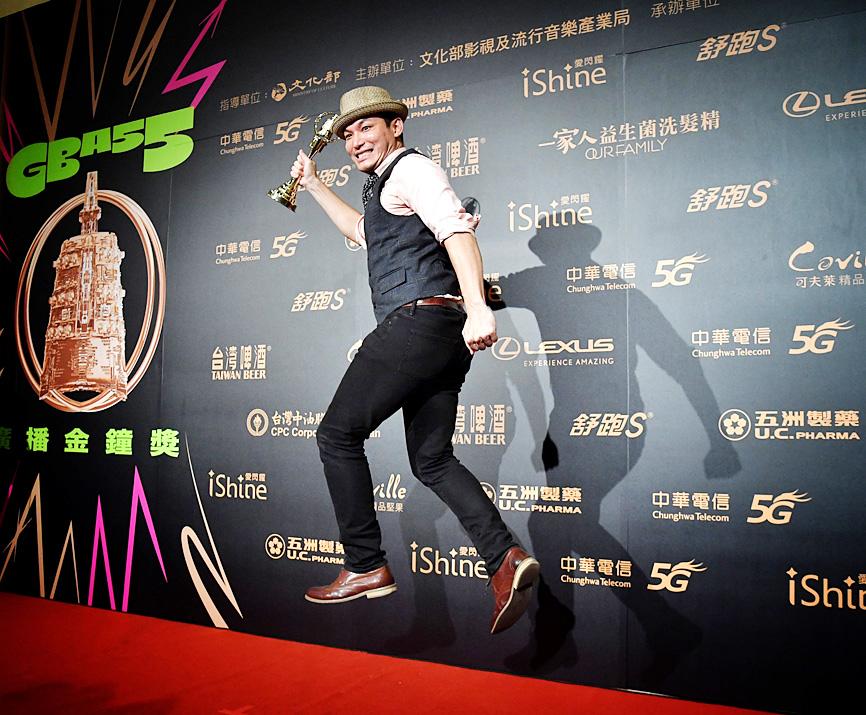A performance video featuring jazz bassist Vincent Hsu (徐崇育) and his ensemble, Soy La Ley Afro-Cuban Jazz Band, premiered on Facebook on Friday.
The performance was the result of a collaboration between the Taipei Economic and Cultural Representative Office in New York and the Rhode Island-based organizer FirstWorks.
The video is to be available on the FirstWorks Web site (http://first-works.org/events/vincent-hsu-soy-la-ley-afro-cuban-band) until Friday.

Photo: CNA
The performance, titled “Jazz Changed, Jazz Changes, Jazz Changin’,” aims to show that jazz is alive and well beyond its birthplace, and as suggested by the title, shows how the genre is always evolving, the organizer said.
The video also features interviews with prominent musicians and academics, including Hsu’s mentor, bassist Cecil McBee, historian Loren Schoenberg, drummer and educator Jerome Jennings, and poet and writer Naomi Extra.
“Jazz is one of the ultimate fashions of expressing oneself, especially because it is spontaneous. No wonder the world at large loves this music, because it never repeats itself,” McBee said.
The video was shot in four locations: Tianhou Temple (天后宮) in Changhua County’s Lukang Township (鹿港), the Jianguo Market in New Taipei City’s Sindian District (新店), the Museum of Old Taiwan Tiles in Chiayi County and the Lavender Cottage tourist area in Taichung.
The music changes and shifts in each location, becoming attuned to the local area while maintaining the essence of jazz, organizers said.
“I think the definition of jazz is the tradition, and the tradition is whatever it is you. The second thing is contemporary times and contemporary culture. And you add those two things, and you get what I think is jazz of 2020,” Schoenberg has said.
Hsu has been heavily influenced by New York’s Spanish Harlem, where he launched his music career, and his music brings together elements of New York jazz, Latin music, African polyrhythms and Taiwanese composition.
During a tour in 2019, Hsu told reporters that an Asian man playing jazz in the US was similar to a foreigner performing in gezai opera in Taiwan.

Chinese spouse and influencer Guan Guan’s (關關) residency permit has been revoked for repeatedly posting pro-China videos that threaten national security, the National Immigration Agency confirmed today. Guan Guan has said many controversial statements in her videos posted to Douyin (抖音), including “the red flag will soon be painted all over Taiwan” and “Taiwan is an inseparable part of China,” and expressing hope for expedited reunification. The agency last year received multiple reports alleging that Guan Guan had advocated for armed reunification. After verifying the reports, the agency last month issued a notice requiring her to appear and explain her actions. Guan

GIVE AND TAKE: Blood demand continues to rise each year, while fewer young donors are available due to the nation’s falling birthrate, a doctor said Blood donors can redeem points earned from donations to obtain limited edition Formosan black bear travel mugs, the Kaohsiung Blood Center said yesterday, as it announced a goal of stocking 20,000 units of blood prior to the Lunar New Year. The last month of the lunar year is National Blood Donation Month, when local centers seek to stockpile blood for use during the Lunar New Year holiday. The blood demand in southern Taiwan — including Tainan and Kaohsiung, as well as Chiayi, Pingtung, Penghu and Taitung counties — is about 2,000 units per day, the center said. The donation campaign aims to boost

The Kaohsiung Tourism Bureau audited six hotels in an effort to prevent price gouging ahead of Korean band BTS’ concert tour in the city scheduled for Nov. 19, 21 and 22 this year. The bureau on Friday said that the audits — conducted in response to allegations of unfair pricing posted on social media — found no wrongdoing. These establishments included the local branches of Chateau de Chine, Hotel Nikko, My Humble House, and Grand Hai Lai, it said, adding that the Consumer Protection Commission would have penalized price gougers had the accusations been substantiated. The bureau said the Tourism Development Act

BACK TO WINTER: A strong continental cold air mass would move south on Tuesday next week, bringing colder temperatures to northern and central Taiwan A tropical depression east of the Philippines could soon be upgraded to be the first tropical storm of this year, the Central Weather Administration (CWA) said yesterday, adding that the next cold air mass is forecast to arrive on Monday next week. CWA forecaster Cheng Jie-ren (鄭傑仁) said the first tropical depression of this year is over waters east of the Philippines, about 1,867km southeast of Oluanpi (鵝鑾鼻), and could strengthen into Tropical Storm Nokaen by early today. The system is moving slowly from northwest to north, and is expected to remain east of the Philippines with little chance of affecting Taiwan,